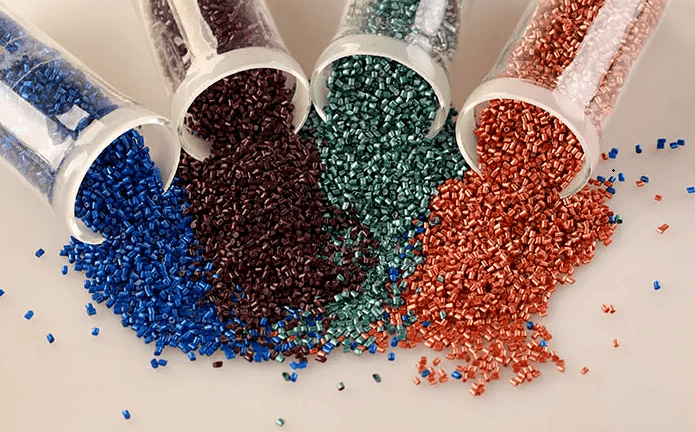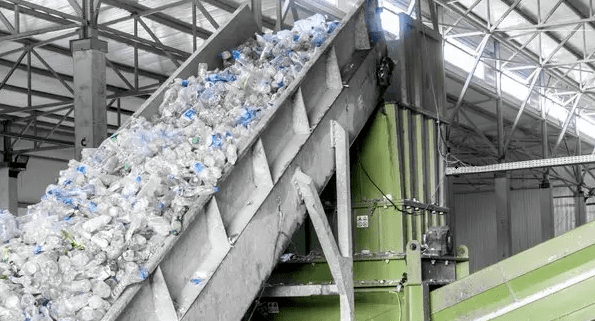As a result of the epidemic, the global demand and use of plastic products are increasing. These plastic products are discarded and bring great damage to the ecological environment. With plastic waste such as masks and gloves being washed up on remote beaches, and plastic packaging from take-out food and couriers piling up in landfills, there is no time to lose in combating plastic pollution.
In order to curb the impact of plastic waste on the environment, governments have introduced governance measures to promote the implementation of policies on the ground. Related companies are also responding to government environmental initiatives and pursuing sustainable operations.

Difficult to reuse Plastic waste becomes a burden
The United Nations reports that the world uses up to 5 trillion plastic bags every year. And only 9% of the world's 9 billion tons of plastic products can be recycled, most of the rest end up either in landfills or in the natural environment. Hard to degrade, low recycling plastic waste to the environment, economic development caused a heavy burden.
According to statistics, Korea produces about 70,000 tons of marine litter every year, of which the percentage of plastic litter is alarming. The 2019 data shows that plastic litter accounts for up to 81.2% of all marine litter when broken down by performance status, and is the number one contributor to the death of many marine organisms.
Data from the South Korean Ministry of Environment shows that South Korea reused only 34.4% of plastic products in 2017. South Korea's environmental experts analyze that the recycled plastic waste is transferred to the processing agency, because some of the foreign substances, quality reduction and other reasons, can not be reused, and eventually only to be destroyed.
As a country surrounded by sea, plastic waste is a serious threat to Australia's marine environment. Australia's Department of Agriculture, Water and Environment states that about 80 percent of marine litter today is plastic. It is estimated that by 2050, there will be more plastic in the ocean than the weight of fish.
In addition, the amount of plastic waste that people create in their daily lives is staggering. Australians use up to 10 million plastic bags a day, and up to 4 billion a year. About 150 million of them end up in the ocean and waterways, and up to 8 million tons of plastic is dumped into the sea every year. Data released by the Australian environment department shows that only 14 percent of the country's plastic waste is recycled each year, including only 3 percent of plastic bags. According to the Statista website, in fiscal 2018, Germany produced approximately 19 million tons of plastic products, about one-third of the total plastic products in the EU. Germans produce an average of about 39 kg of plastic waste per year, far exceeding the EU average of 33 kg.
In the UK, about 700,000 plastic bottles are turned into trash every day. Of the 30 billion plastic bottles used by UK households each year, only 57% are recycled. According to the latest figures for 2019, more than 370,000 tons of plastic can be recycled in the UK each year. Although the amount recycled has increased significantly compared to 2000, when only 13,000 tons were recycled, most plastics end up in landfills or incinerators.
Tricks to solve the problem Governments to solve the problem
Actively responding to plastic pollution is a matter of global ecological protection and high-quality economic development of all countries. In the face of plastic pollution problems, governments have introduced relevant policies to increase the collection and treatment of plastic waste recyclable categories. The National Waste Policy Action Plan 2019 states that Australia will ban the export of waste plastics, paper, glass and tires from the second half of 2020 and phase out problematic and unnecessary plastics by 2025.
Currently, most Australian state and territory governments have banned the use of single-use lightweight plastic bags. In some states and territories, people can also take their discarded plastic bottles to designated locations for recycling and exchange for change. Data from the Australian Retail Consortium shows that single-use plastic bag consumption across Australia has been reduced by more than 80 percent since the country's two largest supermarket chains announced plastic restrictions in July 2018.
In 2018, the UK introduced a new Resources and Waste Strategy to make sweeping changes to the way plastic waste is handled. Businesses and manufacturers will take greater responsibility for paying the full cost of recycling or disposing of their packaging waste, including cars, electronics and batteries. In addition, the UK government signed the Ellen MacArthur Foundation's Global Commitment to a New Plastics Economy in 2018, committing to accelerate the transition to a plastics circular economy.
In recent years, Germany has introduced a number of environmental policies to reduce plastic waste. Since 2015, local supermarkets have stopped providing free single-use plastic bags, a move that has led to a 64% drop in plastic bag consumption . At the end of 2018, the German Ministry of the Environment proposed a "five-point plan" to ban single-use plastic packaging, promote environmentally friendly packaging, enhance the use of recyclable plastic products, avoid the inclusion of plastics in organic waste, fight against marine litter and promote the sustainable use of plastic products, with the aim of reducing the production of plastic products and increasing recycling.
In response to the EU ban on the production of single-use plastic products, which will come into effect in 2021, the German government also decided to ban the sale of several categories of plastic products in July this year.
In May 2018, the Ministry of Environment of Korea released the "Comprehensive Measures for Handling Recyclable Waste", which aims to reduce plastic waste by half by 2030, increase the recycling rate of plastic waste from 34% in 2017 to 70%, and reduce the use of disposable products by 35% by 2022.
Earlier, the Korean government mandated that consumers should not be provided with disposable cups when enjoying drinks in cafes. On August 1 of this year, the Korean Ministry of Environment began a trial policy to reduce the use of plastic products, and businesses that provide disposable cups directly without asking customers' opinions will be fined.
In addition, from 2021, disposable tableware provided in café take-out packaging and take-away will be banned without compensation, and from 2022, supplies such as plastic straws and plastic stirring sticks will be banned altogether. The Korean government says it will provide a "business transition subsidy" to compensate manufacturers who suffer losses from the disposable product restriction policy for part of their business losses. For coffee shops and traditional markets, the Korean government plans to support them by providing dishwashing equipment.
Earlier this year, China's National Development and Reform Commission and Ministry of Ecology and Environment issued "Opinions on Further Strengthening Plastic Pollution Control", which requires a nationwide ban on the use of non-degradable disposable plastic straws in the food and beverage industry by the end of 2020. Experts believe that although the production of plastic straws account for only 0.036% of the total output of plastic products, but its high degree of concern, banned will have a strong demonstration effect on the whole society.

Helping environmental protection companies to promote the "new plastic economy"
In January 2016, a report entitled "The New Plastics Economy - Rethinking the Future of Plastics" was released at the World Economic Forum in Davos, presenting for the first time a vision for establishing a circular economy for plastics, with the aim of applying the principles of the circular economy so that plastics never become waste.
As countries around the world gradually increase their efforts to restrict plastic, various related companies have also innovated technologies and developed related environmentally friendly products to advance the vision of plastic economy to reality through their actions.
At the 2020 Australian National Plastics Summit, industry made several key announcements to showcase how companies are helping to address the plastic waste challenge. Among them, Pact Group, Australia's largest producer of rigid plastics, announced a $500 million investment to update facilities, research and improve technology to increase sustainable packaging use. Increase the recyclable content of its portfolio to 30 percent by 2025. Qantas plans to reduce 100 million single-use plastic items such as cups, cutlery and lunch boxes by the end of 2020, replacing them with compostable items.
In response to the Korean government's call, Korean companies have joined the ranks of environmental protection. A local general food company set up a marine plastic waste management team and launched a "3-year plan" to reduce marine pollution. For the 40 fishing vessels under its management, the management group will reduce the use of plastic products on board by 65.4% within 3 years. In addition, the company's subsidiary has successfully developed ultra-light and environmentally friendly glass bottles to replace the colored plastic bottles used for beer.
Asda supermarkets in the UK will be packaging new plant-based coatings for fresh produce, and have received approval from the European Commission.
London startup CupClub has used electronic tagging technology in the Internet of Things to design a cup recycling system that allows people to use rewashable cups like renting a shared bike by setting up recycling points in the city, and entered into a partnership with McDonald's and Starbucks earlier this year.
In 2019, 30 companies, including German chemical company BASF, formed the End Plastic Waste Coalition in London, which plans to invest a total of $1.5 billion by 2024 to invent technologies to improve waste recycling. In addition, there are many creative companies in Germany "turning waste into treasure", such as the Pentatonic furniture factory in Berlin, using people's daily discarded plastic bottles, disposable cups, etc. to make a variety of tables, chairs and cups.
According to Statista, in 2018, only 4.5% of Germans will buy plastic bags when purchasing food; 57% of the population will not buy single-use plastic bags when shopping; and 72% of the population supports a levy on plastic bags.
Plastic waste-related marches or art exhibitions are often held throughout Australia to increase awareness of plastic reduction. A researcher from the National Ecological Institute of Korea said, "Every consumer should be aware of the importance of reducing the use of plastic products, and only if every individual makes an effort can we achieve real environmental results." The active participation of the general public is indispensable to combat plastic pollution and promote the establishment of a "new plastic economy". With the continuous promotion of policies at the national level, the public's awareness of environmental protection is also rising, and plastic pollution will eventually become a thing of the past.

